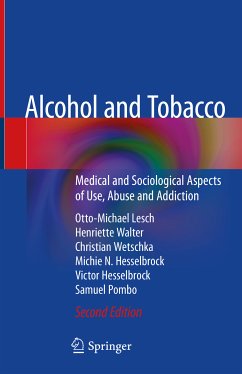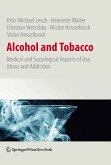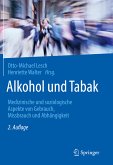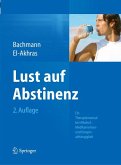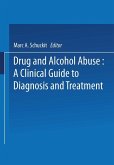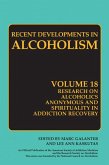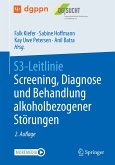Otto-Michael Lesch, Henriette Walter, Christian Wetschka, Michie N. Hesselbrock, Victor Hesselbrock, Samuel Pombo
Alcohol and Tobacco (eBook, PDF)
Medical and Sociological Aspects of Use, Abuse and Addiction
68,95 €
inkl. MwSt.
Sofort per Download lieferbar

34 °P sammeln
Otto-Michael Lesch, Henriette Walter, Christian Wetschka, Michie N. Hesselbrock, Victor Hesselbrock, Samuel Pombo
Alcohol and Tobacco (eBook, PDF)
Medical and Sociological Aspects of Use, Abuse and Addiction
- Format: PDF
- Merkliste
- Auf die Merkliste
- Bewerten Bewerten
- Teilen
- Produkt teilen
- Produkterinnerung
- Produkterinnerung

Bitte loggen Sie sich zunächst in Ihr Kundenkonto ein oder registrieren Sie sich bei
bücher.de, um das eBook-Abo tolino select nutzen zu können.
Hier können Sie sich einloggen
Hier können Sie sich einloggen
Sie sind bereits eingeloggt. Klicken Sie auf 2. tolino select Abo, um fortzufahren.

Bitte loggen Sie sich zunächst in Ihr Kundenkonto ein oder registrieren Sie sich bei bücher.de, um das eBook-Abo tolino select nutzen zu können.
Reflects the new ICD 11 and DSM V classifications
Offers a comprehensive guide for detection and therapy of acohol and nicotine abuse
Provides a classification of disease into groups and subgroups
Presents a description of tailor-made therapies of global validity
Interdisciplinary approach
- Geräte: PC
- ohne Kopierschutz
- eBook Hilfe
- Größe: 10.62MB
Andere Kunden interessierten sich auch für
![Alcohol and Tobacco (eBook, PDF) Alcohol and Tobacco (eBook, PDF)]() Otto-Michael LeschAlcohol and Tobacco (eBook, PDF)40,95 €
Otto-Michael LeschAlcohol and Tobacco (eBook, PDF)40,95 €![Alkohol und Tabak (eBook, PDF) Alkohol und Tabak (eBook, PDF)]() Otto-Michael LeschAlkohol und Tabak (eBook, PDF)13,48 €
Otto-Michael LeschAlkohol und Tabak (eBook, PDF)13,48 €![Alkohol und Tabak (eBook, PDF) Alkohol und Tabak (eBook, PDF)]() Alkohol und Tabak (eBook, PDF)62,99 €
Alkohol und Tabak (eBook, PDF)62,99 €![Lust auf Abstinenz (eBook, PDF) Lust auf Abstinenz (eBook, PDF)]() Meinolf BachmannLust auf Abstinenz (eBook, PDF)42,99 €
Meinolf BachmannLust auf Abstinenz (eBook, PDF)42,99 €![Drug and Alcohol Abuse (eBook, PDF) Drug and Alcohol Abuse (eBook, PDF)]() Marc A. SchuckitDrug and Alcohol Abuse (eBook, PDF)62,95 €
Marc A. SchuckitDrug and Alcohol Abuse (eBook, PDF)62,95 €![Research on Alcoholics Anonymous and Spirituality in Addiction Recovery (eBook, PDF) Research on Alcoholics Anonymous and Spirituality in Addiction Recovery (eBook, PDF)]() Research on Alcoholics Anonymous and Spirituality in Addiction Recovery (eBook, PDF)112,95 €
Research on Alcoholics Anonymous and Spirituality in Addiction Recovery (eBook, PDF)112,95 €![S3-Leitlinie Screening, Diagnose und Behandlung alkoholbezogener Störungen (eBook, PDF) S3-Leitlinie Screening, Diagnose und Behandlung alkoholbezogener Störungen (eBook, PDF)]() S3-Leitlinie Screening, Diagnose und Behandlung alkoholbezogener Störungen (eBook, PDF)50,28 €
S3-Leitlinie Screening, Diagnose und Behandlung alkoholbezogener Störungen (eBook, PDF)50,28 €-
-
-
Reflects the new ICD 11 and DSM V classifications
Offers a comprehensive guide for detection and therapy of acohol and nicotine abuse
Provides a classification of disease into groups and subgroups
Presents a description of tailor-made therapies of global validity
Interdisciplinary approach
Offers a comprehensive guide for detection and therapy of acohol and nicotine abuse
Provides a classification of disease into groups and subgroups
Presents a description of tailor-made therapies of global validity
Interdisciplinary approach
Dieser Download kann aus rechtlichen Gründen nur mit Rechnungsadresse in A, B, BG, CY, CZ, D, DK, EW, E, FIN, F, GR, HR, H, IRL, I, LT, L, LR, M, NL, PL, P, R, S, SLO, SK ausgeliefert werden.
Produktdetails
- Produktdetails
- Verlag: Springer International Publishing
- Originaltitel: Alcohol and Tobacco
- Seitenzahl: 391
- Erscheinungstermin: 29. April 2020
- Englisch
- ISBN-13: 9783030419417
- Artikelnr.: 59371498
- Verlag: Springer International Publishing
- Originaltitel: Alcohol and Tobacco
- Seitenzahl: 391
- Erscheinungstermin: 29. April 2020
- Englisch
- ISBN-13: 9783030419417
- Artikelnr.: 59371498
- Herstellerkennzeichnung Die Herstellerinformationen sind derzeit nicht verfügbar.
Otto Michael Lesch, MD, Specialist in psychiatry and neurology, the author is currently President of the Austrian Society of Addiction Medicine, . Since 1972 he is responsible for long term studies in alcohol dependence. He organized many international clinical trials and basic research in alcohol and tobacco dependence. He served 12 years as secretary of ESBRA and organized European networks for alcohol research. He always bridged the gap between basic and clinical research and developed clinical used tools to define subgroups of addiction for better treatment approaches. His assessment tools are now available in many different languages (www.LAT-online.at).
Henriette Walter, MD, has served as University Professor at the Medical University, Vienna. Dr. Walter is specialized in alcoholism since more than 20 years, both, practically and scientifically, with over 200 publications. She is secretary of the 'AUSAM', the Austrian Society of Addiction Medicine and an ESBRA board member. She is associate editor of the Journal "Hypnose", a field in which she takes an active scientific interest since 1982. She gives regular training courses in medical hypnosis.
Christian Wetschka, PhD, is social pedagogue, working in diverse social therapeutic and pastoral fields, supervisor, founder of Verein Struktur, Vienna, which provides commune-flats for alcohol dependent persons.
Michie N. Hesselbrock, PhD, is Professor Emeritus at the School of Social Work, and Professor of Psychiatry at the School of Medicine, University of Connecticut. She held the Zach's Chair, and was the founder and director of the PhD program at the School of Social Work before her retirement. She has served on several NIH study sections and VA Merit review committees as a regular member and as an ad hoc reviewer. Her research interests include epidemiology, behavior genetics, and health disparities of alcoholism and treatment.
Victor Hesselbrock,PhD, is currently Professor and Interim Chairman, Department of Psychiatry, University of Connecticut School of Medicine. He holds the Physicians Health Services endowed chair in Addiction Studies. Dr. Hesselbrock is the Principal Investigator and Scientific Director of the University of Connecticut's NIH/NIAAA funded Alcohol Research Center and is co-PI of the NIH funded national Collaborative Study on the Genetics of Alcoholism (COGA). He is a past President of the Research Society on Alcoholism (RSA). Dr. Hesselbrock is Associate Editor of Alcoholism: Clinical and Experimental Research, a Review Editor for Addiction, and a member of the editorial board of the Journal of Studies on Alcohol and Drugs. His research interests include: the genetic epidemiology of alcoholism; co-morbid psychiatric conditions and substance dependence; and psychosocial, cognitive, and genetic risk factors for developing alcohol dependence and alcohol-related problems.
Samuel Pombo, PhD, is AssistantProfessor (Lecturer) of the University Clinic of Psychiatry and Medical Psychology of the Faculty of Medicine of the University of Lisbon and Clinical Psychologist of the Psychiatry Department and Mental Health of Santa Maria Hospital, Lisbon. Degree in Clinical Psychology and Master and Phd in addictive behaviors. Member of the Portuguese Association of Cognitive-Behavioral Therapy. He has developed research in the area of alcohol and drug addiction, clinical psychology, psychometrics, cognitive-behavioral psychotherapy, anxiety and panic disorders, adolescence. He is author of several research articles, book chapters and oral presentations, and reviewer in several scientific journals.
Henriette Walter, MD, has served as University Professor at the Medical University, Vienna. Dr. Walter is specialized in alcoholism since more than 20 years, both, practically and scientifically, with over 200 publications. She is secretary of the 'AUSAM', the Austrian Society of Addiction Medicine and an ESBRA board member. She is associate editor of the Journal "Hypnose", a field in which she takes an active scientific interest since 1982. She gives regular training courses in medical hypnosis.
Christian Wetschka, PhD, is social pedagogue, working in diverse social therapeutic and pastoral fields, supervisor, founder of Verein Struktur, Vienna, which provides commune-flats for alcohol dependent persons.
Michie N. Hesselbrock, PhD, is Professor Emeritus at the School of Social Work, and Professor of Psychiatry at the School of Medicine, University of Connecticut. She held the Zach's Chair, and was the founder and director of the PhD program at the School of Social Work before her retirement. She has served on several NIH study sections and VA Merit review committees as a regular member and as an ad hoc reviewer. Her research interests include epidemiology, behavior genetics, and health disparities of alcoholism and treatment.
Victor Hesselbrock,PhD, is currently Professor and Interim Chairman, Department of Psychiatry, University of Connecticut School of Medicine. He holds the Physicians Health Services endowed chair in Addiction Studies. Dr. Hesselbrock is the Principal Investigator and Scientific Director of the University of Connecticut's NIH/NIAAA funded Alcohol Research Center and is co-PI of the NIH funded national Collaborative Study on the Genetics of Alcoholism (COGA). He is a past President of the Research Society on Alcoholism (RSA). Dr. Hesselbrock is Associate Editor of Alcoholism: Clinical and Experimental Research, a Review Editor for Addiction, and a member of the editorial board of the Journal of Studies on Alcohol and Drugs. His research interests include: the genetic epidemiology of alcoholism; co-morbid psychiatric conditions and substance dependence; and psychosocial, cognitive, and genetic risk factors for developing alcohol dependence and alcohol-related problems.
Samuel Pombo, PhD, is AssistantProfessor (Lecturer) of the University Clinic of Psychiatry and Medical Psychology of the Faculty of Medicine of the University of Lisbon and Clinical Psychologist of the Psychiatry Department and Mental Health of Santa Maria Hospital, Lisbon. Degree in Clinical Psychology and Master and Phd in addictive behaviors. Member of the Portuguese Association of Cognitive-Behavioral Therapy. He has developed research in the area of alcohol and drug addiction, clinical psychology, psychometrics, cognitive-behavioral psychotherapy, anxiety and panic disorders, adolescence. He is author of several research articles, book chapters and oral presentations, and reviewer in several scientific journals.
Table of contents
1 Information on the origination of the book
1.1 Aims of this book
1.2 Personal reasons for the first author writing this book
2 Addiction- a short overview over a widespread disease
2.1 Introduction
2.2 Prevention
2.3 Diagnosis of addiction
2.4 Aetiology of addiction
2.5 Secondary disorders and addiction
2.6 Secondary diseases and brain functions
2.7 Subgroups of addicts
2.8 Motivation of addicts
2.9 The path from motivation to therapy
2.10 Addiction and relapse
2.11 Specific groups of addicts
2.12 Addiction and the homeless
2.13 Polytoxicomania
2.14 Non-substance dependence
3 Aetiology of Addiction
3.1 The psycho-socio-biological model
3.2 Psychological theories
3.3 Socialexplanation approaches
3.4 Biological theories about the aetiology of tobacco and alcohol addiction
3.5 Aetiological aspects of tobacco and alcohol addiction from an epidemiological perspective
3.6 Aetiology of addiction from a psychiatric perspective
4 Prevention strategies
4.1 Attitude towards addictive drugs
4.2 Primary prevention of tobacco and alcohol addiction
4.3 Secondary prevention: early diagnosis and early intervention
4.4 Tertiary prevention
5 Diagnosis of abuse and addiction
5.1 Problems concerning psychiatric diagnoses
5.2 Development of the term "addiction"
5.3 Substance related diagnoses in the ICD-10
5.4 Substance related diagnosis in DSM-IV (American Psychiatric Association. 1994)
5.5 Commonalities and differences of ICD-10 and DSM-IV
5.6 Implication of these classification systems for therapy and research
6 Types, dimensions and aetiology
6.1 Alcohol addiction
6.2 Tobacco addiction
6.3 Alcohol addiction: Lesch's typology
6.4 The relationship between alcohol dependent patients according to Lesch`s typology and the
severity of tobacco addiction
7 Motives for alcohol and/or tobacco addicted patients to seek medical help
7.1 Tobacco addiction
7.2 Alcohol addiction
7.3 Sequelae that bring patients into therapy
8 Detection of alcohol and tobacco addiction
8.1 Recommendations for the first contact
8.2 Assessment of drinking behaviour using biological markers
8.3 The clinical dialogue in tobacco addiction
9 Therapeutic strategies for alcohol and tobacco dependence
9.1 Motivation for therapy in different settings
9.2 Pharmacotherapy of alcohol and tobacco dependence
9.3 Pharmacotherapy of alcohol withdrawal
9.4 Alternatives to withdrawal
9.5 Pharmacotherapy of the tobacco withdrawal syndrome
9.6 Medical strategies for relapse prophylaxis
10 Sociotherapy of alcohol and tobacco dependents with regards to Lesch's typology
10.1 Alcohol and tobacco
10.2 The sociotherapeuticmission
10.3 Classification Psychotherapy-Sociotherapy
10.4 Sociogenesis and sociotherapeutic chances
10.5 Sociotherapy in the context of therapeutic phases
10.6 State of the art: overlapping perspectives for sociotherapeutic housing and support
10.7 Motivation- a challenge for whom?
10.8 Sociotherapy as a means of promoting networking
10.9 Sociotherapy with alcohol dependents in the context of Lesch's typology
Appendix 1 Lesch Alcoholism Typology - Questionnaire
Appendix 2 Lesch European Smoker Classification
Index
About the Authors
1 Information on the origination of the book
1.1 Aims of this book
1.2 Personal reasons for the first author writing this book
2 Addiction- a short overview over a widespread disease
2.1 Introduction
2.2 Prevention
2.3 Diagnosis of addiction
2.4 Aetiology of addiction
2.5 Secondary disorders and addiction
2.6 Secondary diseases and brain functions
2.7 Subgroups of addicts
2.8 Motivation of addicts
2.9 The path from motivation to therapy
2.10 Addiction and relapse
2.11 Specific groups of addicts
2.12 Addiction and the homeless
2.13 Polytoxicomania
2.14 Non-substance dependence
3 Aetiology of Addiction
3.1 The psycho-socio-biological model
3.2 Psychological theories
3.3 Socialexplanation approaches
3.4 Biological theories about the aetiology of tobacco and alcohol addiction
3.5 Aetiological aspects of tobacco and alcohol addiction from an epidemiological perspective
3.6 Aetiology of addiction from a psychiatric perspective
4 Prevention strategies
4.1 Attitude towards addictive drugs
4.2 Primary prevention of tobacco and alcohol addiction
4.3 Secondary prevention: early diagnosis and early intervention
4.4 Tertiary prevention
5 Diagnosis of abuse and addiction
5.1 Problems concerning psychiatric diagnoses
5.2 Development of the term "addiction"
5.3 Substance related diagnoses in the ICD-10
5.4 Substance related diagnosis in DSM-IV (American Psychiatric Association. 1994)
5.5 Commonalities and differences of ICD-10 and DSM-IV
5.6 Implication of these classification systems for therapy and research
6 Types, dimensions and aetiology
6.1 Alcohol addiction
6.2 Tobacco addiction
6.3 Alcohol addiction: Lesch's typology
6.4 The relationship between alcohol dependent patients according to Lesch`s typology and the
severity of tobacco addiction
7 Motives for alcohol and/or tobacco addicted patients to seek medical help
7.1 Tobacco addiction
7.2 Alcohol addiction
7.3 Sequelae that bring patients into therapy
8 Detection of alcohol and tobacco addiction
8.1 Recommendations for the first contact
8.2 Assessment of drinking behaviour using biological markers
8.3 The clinical dialogue in tobacco addiction
9 Therapeutic strategies for alcohol and tobacco dependence
9.1 Motivation for therapy in different settings
9.2 Pharmacotherapy of alcohol and tobacco dependence
9.3 Pharmacotherapy of alcohol withdrawal
9.4 Alternatives to withdrawal
9.5 Pharmacotherapy of the tobacco withdrawal syndrome
9.6 Medical strategies for relapse prophylaxis
10 Sociotherapy of alcohol and tobacco dependents with regards to Lesch's typology
10.1 Alcohol and tobacco
10.2 The sociotherapeuticmission
10.3 Classification Psychotherapy-Sociotherapy
10.4 Sociogenesis and sociotherapeutic chances
10.5 Sociotherapy in the context of therapeutic phases
10.6 State of the art: overlapping perspectives for sociotherapeutic housing and support
10.7 Motivation- a challenge for whom?
10.8 Sociotherapy as a means of promoting networking
10.9 Sociotherapy with alcohol dependents in the context of Lesch's typology
Appendix 1 Lesch Alcoholism Typology - Questionnaire
Appendix 2 Lesch European Smoker Classification
Index
About the Authors
Table of contents
1 Information on the origination of the book
1.1 Aims of this book
1.2 Personal reasons for the first author writing this book
2 Addiction- a short overview over a widespread disease
2.1 Introduction
2.2 Prevention
2.3 Diagnosis of addiction
2.4 Aetiology of addiction
2.5 Secondary disorders and addiction
2.6 Secondary diseases and brain functions
2.7 Subgroups of addicts
2.8 Motivation of addicts
2.9 The path from motivation to therapy
2.10 Addiction and relapse
2.11 Specific groups of addicts
2.12 Addiction and the homeless
2.13 Polytoxicomania
2.14 Non-substance dependence
3 Aetiology of Addiction
3.1 The psycho-socio-biological model
3.2 Psychological theories
3.3 Socialexplanation approaches
3.4 Biological theories about the aetiology of tobacco and alcohol addiction
3.5 Aetiological aspects of tobacco and alcohol addiction from an epidemiological perspective
3.6 Aetiology of addiction from a psychiatric perspective
4 Prevention strategies
4.1 Attitude towards addictive drugs
4.2 Primary prevention of tobacco and alcohol addiction
4.3 Secondary prevention: early diagnosis and early intervention
4.4 Tertiary prevention
5 Diagnosis of abuse and addiction
5.1 Problems concerning psychiatric diagnoses
5.2 Development of the term "addiction"
5.3 Substance related diagnoses in the ICD-10
5.4 Substance related diagnosis in DSM-IV (American Psychiatric Association. 1994)
5.5 Commonalities and differences of ICD-10 and DSM-IV
5.6 Implication of these classification systems for therapy and research
6 Types, dimensions and aetiology
6.1 Alcohol addiction
6.2 Tobacco addiction
6.3 Alcohol addiction: Lesch's typology
6.4 The relationship between alcohol dependent patients according to Lesch`s typology and the
severity of tobacco addiction
7 Motives for alcohol and/or tobacco addicted patients to seek medical help
7.1 Tobacco addiction
7.2 Alcohol addiction
7.3 Sequelae that bring patients into therapy
8 Detection of alcohol and tobacco addiction
8.1 Recommendations for the first contact
8.2 Assessment of drinking behaviour using biological markers
8.3 The clinical dialogue in tobacco addiction
9 Therapeutic strategies for alcohol and tobacco dependence
9.1 Motivation for therapy in different settings
9.2 Pharmacotherapy of alcohol and tobacco dependence
9.3 Pharmacotherapy of alcohol withdrawal
9.4 Alternatives to withdrawal
9.5 Pharmacotherapy of the tobacco withdrawal syndrome
9.6 Medical strategies for relapse prophylaxis
10 Sociotherapy of alcohol and tobacco dependents with regards to Lesch's typology
10.1 Alcohol and tobacco
10.2 The sociotherapeuticmission
10.3 Classification Psychotherapy-Sociotherapy
10.4 Sociogenesis and sociotherapeutic chances
10.5 Sociotherapy in the context of therapeutic phases
10.6 State of the art: overlapping perspectives for sociotherapeutic housing and support
10.7 Motivation- a challenge for whom?
10.8 Sociotherapy as a means of promoting networking
10.9 Sociotherapy with alcohol dependents in the context of Lesch's typology
Appendix 1 Lesch Alcoholism Typology - Questionnaire
Appendix 2 Lesch European Smoker Classification
Index
About the Authors
1 Information on the origination of the book
1.1 Aims of this book
1.2 Personal reasons for the first author writing this book
2 Addiction- a short overview over a widespread disease
2.1 Introduction
2.2 Prevention
2.3 Diagnosis of addiction
2.4 Aetiology of addiction
2.5 Secondary disorders and addiction
2.6 Secondary diseases and brain functions
2.7 Subgroups of addicts
2.8 Motivation of addicts
2.9 The path from motivation to therapy
2.10 Addiction and relapse
2.11 Specific groups of addicts
2.12 Addiction and the homeless
2.13 Polytoxicomania
2.14 Non-substance dependence
3 Aetiology of Addiction
3.1 The psycho-socio-biological model
3.2 Psychological theories
3.3 Socialexplanation approaches
3.4 Biological theories about the aetiology of tobacco and alcohol addiction
3.5 Aetiological aspects of tobacco and alcohol addiction from an epidemiological perspective
3.6 Aetiology of addiction from a psychiatric perspective
4 Prevention strategies
4.1 Attitude towards addictive drugs
4.2 Primary prevention of tobacco and alcohol addiction
4.3 Secondary prevention: early diagnosis and early intervention
4.4 Tertiary prevention
5 Diagnosis of abuse and addiction
5.1 Problems concerning psychiatric diagnoses
5.2 Development of the term "addiction"
5.3 Substance related diagnoses in the ICD-10
5.4 Substance related diagnosis in DSM-IV (American Psychiatric Association. 1994)
5.5 Commonalities and differences of ICD-10 and DSM-IV
5.6 Implication of these classification systems for therapy and research
6 Types, dimensions and aetiology
6.1 Alcohol addiction
6.2 Tobacco addiction
6.3 Alcohol addiction: Lesch's typology
6.4 The relationship between alcohol dependent patients according to Lesch`s typology and the
severity of tobacco addiction
7 Motives for alcohol and/or tobacco addicted patients to seek medical help
7.1 Tobacco addiction
7.2 Alcohol addiction
7.3 Sequelae that bring patients into therapy
8 Detection of alcohol and tobacco addiction
8.1 Recommendations for the first contact
8.2 Assessment of drinking behaviour using biological markers
8.3 The clinical dialogue in tobacco addiction
9 Therapeutic strategies for alcohol and tobacco dependence
9.1 Motivation for therapy in different settings
9.2 Pharmacotherapy of alcohol and tobacco dependence
9.3 Pharmacotherapy of alcohol withdrawal
9.4 Alternatives to withdrawal
9.5 Pharmacotherapy of the tobacco withdrawal syndrome
9.6 Medical strategies for relapse prophylaxis
10 Sociotherapy of alcohol and tobacco dependents with regards to Lesch's typology
10.1 Alcohol and tobacco
10.2 The sociotherapeuticmission
10.3 Classification Psychotherapy-Sociotherapy
10.4 Sociogenesis and sociotherapeutic chances
10.5 Sociotherapy in the context of therapeutic phases
10.6 State of the art: overlapping perspectives for sociotherapeutic housing and support
10.7 Motivation- a challenge for whom?
10.8 Sociotherapy as a means of promoting networking
10.9 Sociotherapy with alcohol dependents in the context of Lesch's typology
Appendix 1 Lesch Alcoholism Typology - Questionnaire
Appendix 2 Lesch European Smoker Classification
Index
About the Authors
From the reviews:
"This is an updated English-language version of a well-established comprehensive German book on alcohol and nicotine addiction. ... The book is written for all professionals, clinicians, researchers, and students involved in or interested in the care and treatment of alcohol and nicotine addicted patients. ... This is a comprehensive account of the different interactions among personality, environment, and effects of the substance and biology on addiction. ... an excellent reference and a must read for individuals in this field." (Michael Easton, Doody's Review Service, May, 2011)
"This is an updated English-language version of a well-established comprehensive German book on alcohol and nicotine addiction. ... The book is written for all professionals, clinicians, researchers, and students involved in or interested in the care and treatment of alcohol and nicotine addicted patients. ... This is a comprehensive account of the different interactions among personality, environment, and effects of the substance and biology on addiction. ... an excellent reference and a must read for individuals in this field." (Michael Easton, Doody's Review Service, May, 2011)
